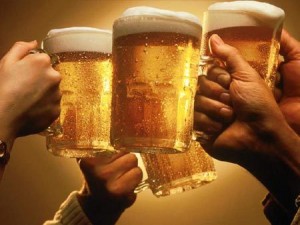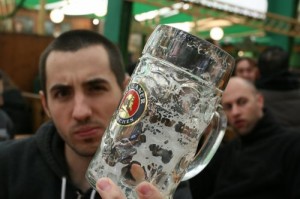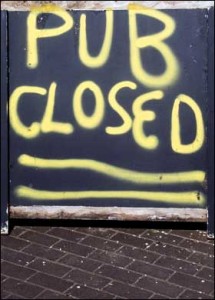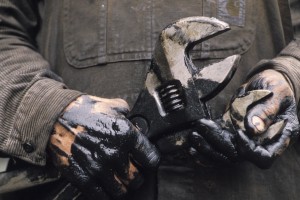Pity the UK government. Like most, they have had a great deal of trouble closing the gap between money spent and tax revenue. And, like most, they have scrambled to raise taxes in order to increase the amount of money coming in.
One of the items hardest hit with rising tax rates in Great Britain is beer.
The powers-that-be have enacted a “beer duty escalator“, which automatically raises the tax on beer by 2% over inflation every single year. According to the article behind the last link, the average beer drinker in the UK now pays £177 every year just in taxes alone. The average pub owner must shell out £66,000 per year in beer taxes, above and beyond the overhead costs that come from running any small business. And, thanks to the automatic increases, every year is going to be worse than the last.
As any economist who hasn’t drunk deep of the Liberal kool-aide will tell you in a heartbeat, adding frivolous costs to any commodity will result in limiting demand. Beer sales in the UK have plummeted, while close to a score of pubs across the island nation have been going out of business every week.
Just think of all those people who were dependent on the family business, now out of work and on the dole. I don’t have the numbers to tell for sure, but it wouldn’t surprise me in the least to find out that any jump in revenues realized by the beer duty have been more than offset by the increased number of people who now rely on public assistance.
There are also hidden social costs. Enjoying a pint at the local public house is probably the most firmly entrenched tradition when it comes to gatherings in the United Kingdom. And yet, the government is destroying that tradition. I bet the politicians never thought that was even possible, and just assumed that raising beer taxes through the roof was a sure fire way to get extra cash in the budget without harming anyone. This is a classic example of how governments which screw around with everyday financial activity usually jack things up.
So that is the situation over in the United Kingdom. What about here in the US?
Well, it just so happens that beer sales have started to improve after the 2007 economic crash dropped them into the abyss. This article from the WSJ attributes the rise at least partially to the booming energy industry, which makes sense. Not only would blue collar workers running the rigs have some cash to spend, but they would also enjoy cutting through the crude with a beer after their shift ends.




The beer in pubs is certainly expensive and the tax excessive, and I’ve seen plenty of pubs close down. N.B. many smoking bloggers blame a lot of this on the smoking ban.
Also the other observation that any but those unaware of or denying reality would make: contraband will increase. Which will have its own social costs, not only in policing, but in shaping morality.
The law of unintended consequences remorselessly strikes again….
So I would guess that this would be an open opportunity for a home-brewing movement? Yes? No? The local place here in San Antonio which caters to home-brewing, wine-making and cheese-making in my neighborhood has had an incredible two or three years … everyone is getting into the D-Y-I thing here. (And our homemade cheese is AWESOME!)
Enjoying a pint at the local public house is probably the most firmly entrenched tradition when it comes to gatherings in the United Kingdom. And yet, the government is destroying that tradition.
The destruction of the community that surrounds a pub might actually be the long term goal of Leftists. Leftist ideology always evolves to atomize people. Atomization seeks to destroy any sources of support for the individual, church, social clubs, friends and even family. The draw for Leftists is that someone who feels utterly alone in society will have no choice but to turn to the state for security. In the worst case, it also destroys any pre-existing organization that people can use bring pressure on the government or even rebel.
The Left in the west as a long history of attacking social organizations while at the same time bribing people to become atomized by having the state take over many of the support functions of family, friends and informal community.
Shannon,
That’s an interesting take. I’ve usually thought of it the other way around.
While the left certainly seems to have it in for family and to some extent businesses, in most cases they seem to be keen on groups rather than people.
Doesn’t it seem that group membership as some kind of litmus test for legitimacy is a wide spread idea in modern life which is strongest on the left?
I usually view it as both left and right trying to break down the legitimacy of the individual and the voluntary association in order to replace them with dependence on organized religion, which on the left means government.
I’ve been struggling for a long time with how to accurately express my horror at the idea of a world in which the individual is only able to act as a member of a group, so I won’t be surprised if nobody knows what I’m talking about. Perhaps unclear communication in this regard is related to unclear thinking… I’ll keep working on it.
Maybe it would be better if the communities were organized into beer drinker’s unions, with local numbers, card check voting, admission restrictions by personal influence, union leaders, and… of course, dues and campaign contributions, then they’d have legitimacy.
John,
Doesn’t it seem that group membership as some kind of litmus test for legitimacy is a wide spread idea in modern life which is strongest on the left?
The “groups” that the Left likes are not actual organized collections of individuals but instead abstractly defined political marketing demographics e.g. women, gay, elderly, black, hispanic etc. The Left likes such groups, always defined by some innate charateristic, because they’ve learned that Mussolini was correct and that in politics like-clings-to-like.
The left doesn’t like individuals voluntarily joining up together in some human scale group that can get things done if need be. A bunch of guys who’ve all hung out at the same pub for years all know and trust each other and if one of their members needed help they could respond. Churches, small businesses social clubs, book clubs, boy scouts, sports teams etc all form organized and functional groups that individuals can call for aid if necessary. Extended family is also important. People who have such a support system are happier, healthier, earn more and live longer. They feel safe secure and supported so they are less likely to turn to the government to provide a material and psychological safety net. They also trust their fellow citizens more and don’t feel the need to use the government to monitor and regulate them.
The Left wants people to feel alone and constantly threatened. People that feel like that vote for big government to protect them.
I’ve been struggling for a long time with how to accurately express my horror at the idea of a world in which the individual is only able to act as a member of a group, so I won’t be surprised if nobody knows what I’m talking about.
Human’s can only act as members of groups. We’re a social species, that’s what we do. For example, if your building something and you two people to hold something up while it nails in place, your in a group. If you fall ill or suffer injury and need care, who ever takes care of you is the group.
Societies have to be organized and a large scale civilization needs large scale organization. The only question is: how do we form that organization? Do we do it by bottom up with individuals voluntarily choosing which group or team to join to accomplish any particular task or do we do it top-down with individuals violently coerced into a virtual single mega organization ruled by a small number of self appointed elites?
The story of America prior to WWI, is an amazing story of bottom-up, voluntary organization by diverse individuals who all had to figure out how to survive and prosper without some overarching authority making them behave. That’s one reason why the Left so hates the veneration of the frontier, it showed people didn’t need betters telling them what to do.
So, you need groups and teams just to almost anything the only real question is whether you get to pick you own groups to join or leave or whether someone marches you into the group at gunpoint.
Shannon,
I really agree very much with your last paragraph, and that is where it all comes down to a point.
Struggling, as I said.
I just wrote a 5000 word reply which is not appropriate for a blog comment…
Let me ask some questions instead:
(setting aside demographic groups as a different issue)
Groups the left likes: Don’t they also like activist groups, save the whales, Sierra Club, JournoList, Unions, League of certified etc. ?
What role does “official” group membership play in this; rules, membership roles, dues, admission requirements, membership obligations, defined leadership and officers, societal and governmental recognition?
How are we defining “groups” for the purposes of this discussion?
Perhaps, that definition is key, because informal groups don’t worry me much, it is “official” groups which worry me.
You say that people feel more secure and comfortable as members of a group. Again, by my definition, the more groups I’m a member of the more exposed I feel, and I’d expect most introverts to feel the same way.
How does “being a member of a group” differ from simply having friends? Are you saying it is better, if so, why?
What groups do you, or other people belong to, which they find beneficial?
John,
Perhaps, that definition is key, because informal groups don’t worry me much, it is “official” groups which worry me.
Yes, it all hinges on whether individuals are free to join or walk-away as they choose. It’s like the free-market. Individuals will join groups that they judge are doing something good and useful and will abandon those that don’t.
Groups the left likes: Don’t they also like activist groups, save the whales, Sierra Club, JournoList, Unions, League of certified etc. ?
What were really looking for is less group and more “community” i.e. a situation in which people have an emotional connection to each others as individuals. Political activist organizations are groups but they are impersonal. No feels safe and supported in their personal lives because they wrote a check to greenpeace.
Also, note that all Leftists organization are political in nature and tied almost exclusively to Democratic party. That makes them effectively part of the state.
You say that people feel more secure and comfortable as members of a group. Again, by my definition, the more groups I’m a member of the more exposed I feel, and I’d expect most introverts to feel the same way.
There’s actually rather a lot of study on this matter. Having a lot of friends, and extended family, belonging to a church and/or social organization e.g. Jaycees, being a little league coach etc. are all powerful predictors of personal happiness and health. It even predicts things like who will better survive a plane crash or try to rescue someone in a plane crash.
Humans evolved to operate in small communities. Most hunter-gather societies have stable groups of under 60 and the average is more like 30-40 (it depends on the local conditions.) Hunter-gathers have few material goods and they can’t store food nor trade food over long distances. If you have a stretch of bad luck hunting you’ll starve without people willing to share with you. Your only defense against attack of any kind is people willing to risk their lives for you. All that means the only security any human has had over 98% of our evolution history has been family, friends and allies all of which are personally known to the individual, often over the course of their entire lives.
Our physiology and psychology would evolve to both induce us to join groups and build relationships as well as allocation mental and body resources differently depending on whether we think we are in a group or not. When people belong to an intimate or personal group and feel supported, their body stops “worrying” and drops the stress reaction because the likelihood of needing the reaction diminishes. Your body “worries” less about not having food so you don’t overeat as much. You know people have your back so brain lowers you sense of paranoia and you’re more trusting of strangers.
It’s not all puppies and sunshine of course, there are also tradeoffs in the lose of personal autonomy and privacy. I grew up in a small town and there wasn’t a government camera anywhere but it was effectively a surveillance society because everybody knew everyone almost by face. Someone spotted you everywhere you went. Your job or business success could depend on how the community evaluated your personal life. If you screwed up 30 years later people would still remember. If you’re new in town, you have to earn people’s trust. On the hand, when the sh*t hit the fan, a small army would materialize out of nowhere to help. If your rep is good, you can borrow money from the bank on a hand shake. You don’t have to worry about your kids when they go out and you know their teachers outside of school.
If you personally don’t feel safe in an intimate or personal group like a club or church, it’s most likely because you don’t actually feel bonded to the people in the group for some reason. It can happen. A lot of people lose emotional connection with their families if their values and life diverge strongly. People who have been betrayed can have serious trust issues. Children of divorce also have trust issues that make them slow to commit and to commit relatively weakly.
I think also that if you grow up in an atomized environment, e.g. big city, single parent, no extended family, no church or similar group, you probably don’t even know how to feel or act in such a group. I think that urban atomization and “alienation” versus the community feel of small towns and rural areas influences why urbanites vote more to the left and non-ubanites more to the right.
Ha, yeah I remember this dude. Turned out to be a dcenet night. For the record, Solo is located @ 1502 Cortelyou Rd. On the corner of Cortelyou & Marlborough Rd.The bartender that night was cool as fuck. In addtion to buying back a few rounds, letting us play Birdman’s Money to Blow & several Kid Cudi tracks super loud was icing on the cake! We Certified Gettin it!